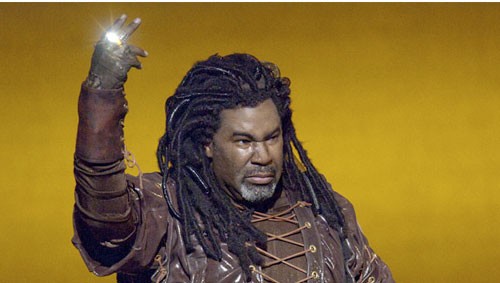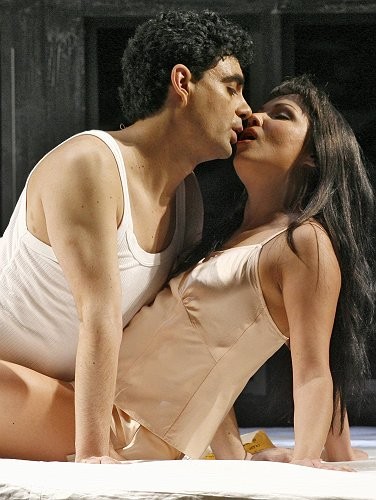Opera Notes: Peter Gelb Controlling the Message
Does the Met Deserve Great Divas Dessay, Mattila, Blythe?
By: Susan Hall - Mar 29, 2012
With the seasonal change divas are springing forward at the Metropolitan Opera.
First up was a hottie from Europe, Nadja Michael, singing the treacherous role of Lady Macbeth. Regulars in the house allegedly dubbed this debutante a fictive award as “Worst Soprano Ever to Sing at the Met."
Next up was Anna Netrebko in Massanet’s Manon. We reported a superb performance in the role by Natalie Dessay at Opera Bastille. Dessay is described as persona non grata after apparently refusing to work again with Mary Zimmerman. As this site has reported, Zimmerman, a renowned theatrical director, knows relatively little about music. Was Dessay in the wrong?
Netrebko is no Dessay. She can flounce and flutter around the stage. That she is always waiting to display her brilliant top, and seemingly cares not a fig for creating a role or displaying style, can sometimes be masked. Manon is a more complex role, and waving your arms like a bird trying to fly is not acting. It is rather distracting. Netrebko’s voice is too dark for the role.
Unfortunately, Netrebko does not always sing on pitch. At one moment, you wondered what Maestro Fabio Luisi, clearly a master of French repertoire as well as German and Italian, would do to bring the orchestra into Netrebko’s key. Fortunately, the golden age tenor Piotr Beczala entered. His performance was so well honed that you sometimes forgot the floating diva. She of the errant pitches.
Dessay herself arrives for an eagerly anticipated performance as Violetta in La Traviata. She may well dispel memories of another Met administration's favorite, non-singing diva, Marina Poplavskaya. Karita Mattila is sure to be a fantastic Elina in the Makropolous Case. We will also be treated to a great diva, Stephanie Blythe, in the Ring, if you can endure this production in a second viewing. Blythe may not be reason enough to suck it up.
Peter Gelb is putting on roadshows to boost the Met's Ring. The word is out. People don’t want to go. Why should they? The set does not work and while some performances, like Blythe’s, Eric Owens’ and Gerhard Siegel’s, are top of the line, Voight should not be Brunnhilde and other great singers are miscast. Bryn Terfel comes to mind as not-a- Wotan.
Gelb works hard to control the Met’s outgoing messages. He is fortunate to have a sympathetic New York Times. It is less of a sure thing whenever Zachary Wolfe, writing for the Observer, enters the house. Writing about the Met is a promotion activity in Gelb’s mind. With tickets at the Met topping off at $490 dollars each potential patrons deserve more honest reports from the mainstream media.
Gelb, on the road in an Apple store program, had Voight and Owens on message addressing this point. Each of them said that they did not perform differently for the HD. This is not exactly the issue. Casting is done for the HDs. Bringing in the IT girl Michael, a thin blond non-singer, is a way to capture another HD star. Heavily promoted Isabel Leonard is lovely and has a lovely small voice, but she is an obvious courtsey to the HDs. Leonard’s voice is small and is unlikely to become larger. Reliable sources suggest that she is miked in the house. In the Met administration’s past, miking was a no-no. It is a no-no in most houses in the world.
John Adams likes his singers miked to make them more comfortable in performance. Comfortability is not a consideration at the Met. Again, trying to control the message, Voight and Owens said they felt more comfortable on the Ring set, but you have to wonder.
Poplavskaya is another HD choice. The failure of this year’s Faust, in which she drove two great singers around the bend, is a perfect example of unfortunate casting to satisfy the camera, not a live audience. There are other accommodations to the HD which deprive a live audience of performances they deserve.
Nothing in Gelb’s roadshow answers fundamental questions about the Ring. LePage pumped his set, visuals of wonderful moments were attractive, making the set seem more consistently engaging than it is. The stairs descending to Niebelung are riveting as is the Walkeres' arrival. But these images are few and far between. What will become of the picnic tables at the back of the Walkere set, to which the great Jonas Kaufman is consigned because only Gods are allowed on the apron.
Again, on message, Voight talks about the need for opera singers to act. "We can’t park and bark anymore," she laughed. Well, if someone is a great singer they can bark and park because the theatricality of a singer starts with the singing. If emotion is poured into the vocalization, the performance is effective. If a singer like Angela Meade can be taught to move to the music, step two of a theatrical opera performance, the performance will work. Neither LePage or Gelb appear to understand what makes opera good theater. Gelb is trying to cover up inadequate opera performance in the house by claiming a new effort to make it so. Everyone who really cares about this effort is in Chicago, looking at Calixto Bieto’s efforts at the Goodman Theater.
.
Gelb laughs at attacks by Alex Ross in the New Yorker, but clearly is upset by them. A new documentary by Met-trusted Susan Froemke will premier at the Tribeca Film Festival in New York this spring. Gelb himself writes for the Huffington Post.
Now Gelb, presenting at an Apple Store, is looking for support from Mac aficionados. Those hip young people who showed up for the San Francisco Symphony at Carnegie this week don’t come to the Met. They were not in the audience at the Apple Store.
Also in an effort to attract a younger audience, Gelb is launching a new App with Met performances past. However, marketing this app at $14.95 is a price point five dollars above the usual. Certainly the geniuses wandering around the Apple store thought this price was far too high. Charging subscribers to switch a performance from one opera to another is a dollar-deaf message to supporters. Perhaps they have come to feel that Gelb and The Met are only interested in the buck.
Selecting a shot of the horse Brunnhilde mounts to go to her immolation is not smart marketing. Scrawny and full of holes, the magnificent images from War Horse, the Met’s near neighbor, make the Met’s hag look tacky by comparison. Perhaps the Met administration simply doesn’t know how bad this Ring is. Maybe they think that they can solve everything by changing the message.
If they can, it is a sad day for opera.




